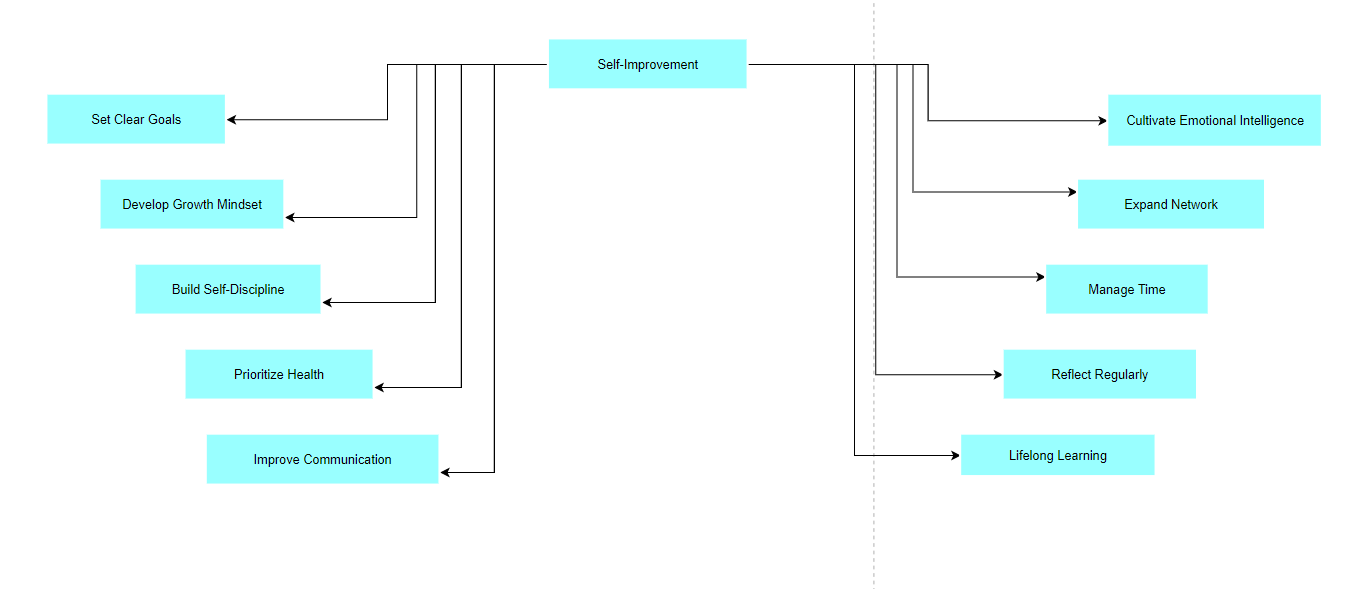Table of Contents
- Introduction
- Challenges and Concerns
- Broader Impacts of Professional Challenges
- Practical Solutions and StrategiesContinuous Learning
- Conclusion

In today’s fast-paced job market, professional growth is more important than ever. The need to keep improving yourself professionally is a big concern for many who want to improve yourself and advance in their careers. Whether you are looking to move up in your current role or switch to a new career path, knowing how to improve yourself is key to achieving success. This article will give you 10 ways to improve Your skills and move up your career, addressing the problems and providing solutions.
1. Set Clear and Achievable Goals
Setting goals is crucial for providing direction and motivation, making it a key element of personal growth. To create effective goals:
– Follow the SMART framework: Ensure your goals are Specific, Measurable, Achievable, Relevant, and Time-bound.
– Divide larger goals into smaller, manageable tasks.
– Regularly check your progress to stay aligned and make any needed changes.
By concentrating on clear goals, you ensure that each action you take brings you closer to your desired results.
2. Develop a Growth Mindset
A growth mindset, a concept introduced by psychologist Carol Dweck, is the idea that skills and intelligence can be developed through effort and perseverance. Individuals with a growth mindset:
– Welcome challenges and see failures as chances to learn.
– Build resilience when facing difficulties.
– Actively seek feedback to enhance their abilities.
Embracing this mindset can unlock new opportunities for learning and personal growth.
3. Build Self-Discipline
Self-discipline is an essential quality for anyone looking to better themselves. It helps maintain focus on your goals and resist distractions. To strengthen self-discipline:
– Establish routines that support your goals.
– Reduce distractions by organizing your surroundings.
– Implement time management strategies like the Pomodoro technique to keep your attention sharp.
4. Prioritize Physical and Mental Health
Your overall health plays a significant role in your ability to grow and succeed in both personal and professional aspects. To enhance your health:
– Engage in regular exercise, aiming for at least 30 minutes daily.
– Maintain a balanced diet that nourishes both your body and mind.
– Practice mindfulness and meditation to alleviate stress and enhance mental clarity.
– Ensure you get sufficient sleep (7-8 hours each night) for optimal recovery of your brain and body.
Taking care of your physical and mental health is essential for ongoing self-improvement.
5. Improve Communication Skills
Good communication is essential for building personal relationships and achieving success in your career. To improve your communication, consider the following:
– Practice active listening by concentrating on understanding what others are saying before you reply.
– Speak clearly and concisely to express your ideas effectively.
– Use non-verbal signals, like maintaining eye contact and appropriate body language, to strengthen your message.
– Work on your writing skills by reading a lot and writing regularly.
By mastering these skills, you can boost both your professional interactions and personal connections.
6. Embrace Lifelong Learning
Education doesn’t end after school; it’s important to keep learning throughout your life. Ongoing education helps you stay sharp and adaptable in your career. Here are some ways to encourage lifelong learning:
– Read books, articles, or journals related to your interests.
– Enroll in online courses or attend workshops to learn new skills.
– Join professional organizations or forums to share knowledge and ideas with others.
The more you learn, the more opportunities you’ll find to apply that knowledge and grow.
7. Cultivate Emotional Intelligence
Emotional intelligence (EQ) is the ability to understand and manage your own emotions, as well as those of others. Individuals with high EQ:
– Can recognize and control their emotions, especially in stressful situations.
– Show empathy towards others, which helps build stronger relationships.
– Resolve conflicts in a calm and respectful manner.
Improving your EQ can enhance teamwork, leadership, and your connections with others.
8. Expand Your Professional Network
Networking is a key strategy for advancing your career and personal growth. To create a strong network:
– Attend industry events, whether in person or online, to meet new people.
– Be active on social media, particularly platforms like LinkedIn, where professionals connect and share ideas.
– Contribute to your network by sharing knowledge, making introductions, or collaborating on projects.
A strong network can lead to new opportunities and provide valuable support.
9. Effectively Managing Your Time
Time management is crucial for balancing your personal development with your job responsibilities. Here are some ways to enhance your time management skills:
– Rank your tasks by their significance and deadlines.
– Utilize productivity tools such as to-do lists or apps that help you organize and plan your tasks.
– Delegate tasks whenever you can, so you can concentrate on the most important activities.
By managing your time wisely, you ensure that you are working efficiently towards your objectives.
10. Reflect and Adapt Regularly
Taking time to reflect on your experiences allows you to evaluate your progress and make necessary changes to your plans. To build a habit of self-reflection:
– Maintain a journal to record your successes, challenges, and lessons learned.
– Periodically review your goals to make sure they still match your current priorities.
– Stay open to change as you evolve, and don’t be afraid to modify your strategies for better results.
Reflection offers valuable insights that can help guide your ongoing growth.

Conclusion
Improving ourselves is a journey that lasts a lifetime. It requires us to set specific goals, develop self-discipline, and be open to learning new things. By applying the strategies mentioned, we can achieve significant progress in both our personal and professional lives. The most important part is to take steady and purposeful steps that lead to real change.


